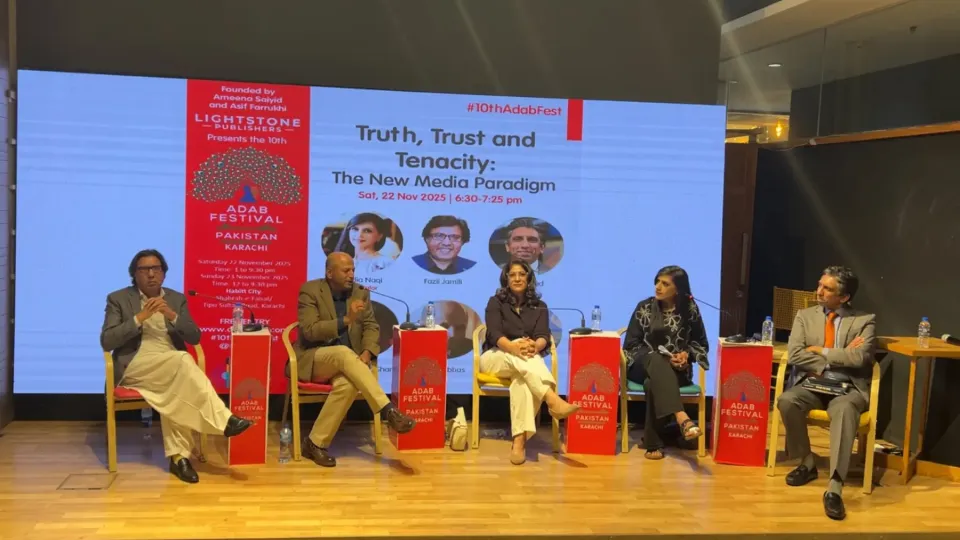November 24, 2025
ISLAMABAD – If ‘post-truth’ was Oxford Dictionaries’ 2016 Word of the Year, then ‘post-reality’ reflects the even murkier information climate unfolding today, one where audiences and journalists alike struggle to navigate competing narratives and contested facts.
This shifting landscape framed the session ‘Truth, Trust, and Tenacity: The New Media Paradigm,’ held on Saturday, which brought together journalists Fazil Jamili, Azhar Abbas, Amber Rahim Shamsi and Azaz Syed under the moderation of Nadia Naqi.
The discussion was part of the Adab Festival, which returned to Karachi for its 10th edition at Habitt City from November 22 to 23.
Opening the discussion, Naqi noted the challenges journalists face in working and surviving in the current media environment.
“Speaking the truth comes with challenges; often we’ve seen journalists being intimidated, and the controlled environment makes it difficult to speak the truth,” she said. “With truth, of course, comes trust. Is there public trust in the media? That’s the big question; it’s a challenge, actually.”
Naqi asked how difficult it had become for traditional media outlets to remain relevant and compete in the new media paradigm, where social media, content creators, YouTubers, and digital platforms held huge influence.
Abbas, currently Managing Director at Geo TV Network, said the pervasive noise made it much harder to speak the truth. He opined, without naming anyone responsible, that over the past 15 years, “social engineering” had created clouds of lies, misinformation, and doubt aimed at discrediting the political class, journalists, and human rights activists.
“Beyond mainstream media, digital and social media are also used to spread misinformation. It takes a long time for a journalist, politician, or human rights activist to build trust, but that trust can be destroyed in a minute by social media propaganda,” he added.
“We ourselves question whether we are still relevant,” Abbas said, adding that legacy media still holds its audience in terms of numbers.
Naqi emphasised that censorship goes beyond shutting down news outlets or intimidating journalists, affecting their families as well. She noted that issues which cannot be raised on television are often addressed through digital platforms.
Shamsi, Pakistan Editor at Nukta, responded that even though digital media avoids censorship faced by traditional outlets, it comes with its own challenges.
“We exist in a time where there’s never been so much access to information,” she said. According to her, digital platforms prioritise clicks and views and appeal to the reactive, emotional side of the brain rather than encouraging rational thought. “You will prefer somebody who will agree with your views and opinions. That will confirm your bias.”
Another limitation, Shamsi said, came from the platforms themselves, including YouTube, Google, Meta, and X. Political and commercial interests shaped content distribution, where platforms profited from outrage, favouring content with sensational headlines and thumbnails.
“If you use keywords like ‘genocide’, ‘rape’, ‘murder’, or ‘Palestine’ in your [search engine optimisation], then you might get shadowbanned. Because it’s not your own platform, distribution remains an issue even in digital media,” she said.
Amid Israel’s onslaught in Gaza, social media platforms have reportedly been accused of curtailing the reach of pro-Palestine or Israel-critical content, though the companies deny it.
“Globally, journalism is struggling, and I don’t think truth is important anymore,” Shamsi added.
Moderator Naqi indicated that journalists today often felt as though they were “competing with creators on TikTok and YouTube, despite their core responsibility being to report news and seek the truth”. She questioned whether the profession itself was partly to blame, emphasising that social media had deepened divisions within journalism, including within press bodies.
Jamili, President of the Karachi Press Club (KPC), said the line between information and journalism had become increasingly blurred, largely because of social media. “Journalists themselves are confused, and even mainstream media gets caught up when something comes up on social media,” he said.
“There’s no comparison between speed and accuracy. You need time for the truth; only then is there trust. These are things we’ve abandoned over time,” he lamented.
Jamili said censorship had evolved, with self-censorship now the most prevalent form. Editors and reporters, he added, often wrote with fear.
It is worth noting that Reporters Without Borders ranked Pakistan 158 out of 180 countries in the World Press Freedom Index 2025.
He argued that algorithms effectively replaced the editor’s role. “Earlier, editors decided which stories mattered, assessed their quality and relevance, and determined how they should be published. Now the algorithm dictates the priorities, and we’ve become captive to it.”
Speaking about KPC, he said that although it had around 1,800 active members, more than half were unemployed. With delayed wages and salary backlogs stretching three to four months, he asked, “If a journalist is hungry, how can you expect them to be honest?”
Syed, also associated with Geo TV Network, disregarded using the word “truth” and argued that it was subjective, with each religious or political group holding its own version. “My job is to collect facts,” he said, emphasising instead the need for journalists to distinguish between facts, assumptions, and opinions.
On the role of editors, Naqi noted they were once considered “untouchable”, but said the editors themselves no longer pushed back the way they used to. Jamili added that the practice of editorial writing had effectively disappeared. He mentioned that one of Pakistan’s largest-circulated Urdu newspapers no longer published editorials, yet “no one seems to care”.
In response to a question about controversial media ownership and the influence of land developers in Pakistan, the journalists stressed that such challenges plagued the industry globally.


